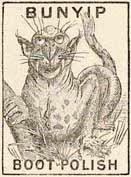DRUM ROLL, please (no, not that Drum): the correct answer to the competition to spot the genuine,authentic Aboriginal representative on the ABC Advisory Board is Dr
Patrick Bradbery, the fellow with the bush beard any casual observer, if not
otherwise alerted, might take just as easily as an indication of rabbinical
lineage. Perhaps the Charles Stuart University academic moonlights as a mohel who prefers to perform his sacred duties
with a sharp stone or broken bottle. In this age of multicultural melding, who can tell?
What we do know is that Dr Bradbery counsels the
ABC about its operations and content and, as the author of many tracts and little tomes
about the art of learning, that he is especially qualified to help chart the broadcaster’s
course. One of his papers, “Arcane Diversity: Is
It More Important than the Superficially Obvious?”, seems particularly
germane:
When the word diversity is mentioned in contemporary discourse, it evokes concepts like age, race, gender, religious expression, marital status and sexual preferences. While these are undoubtedly important markers of diversity, they are but the more or less obvious indicators that can lead to unproductive stereotyping. Hidden below the surface is a vast ocean of diversity that is harder to detect and consequently often ignored. Just a few examples of this diversity include: access to resources; knowledge; skills; physical health; emotional health; mental health; learning; development; personality; wealth; motives; intents; belief systems; and intelligence. This paper explores just a small part of that ocean in an attempt to bring to the surface one of the vital dimensions of understanding and responding to diversity. That part is that of learning and development. The paper is based on a transcendental phenomenological study of learning and development carried out by the author as a part of his doctoral studies. The conclusion drawn is that facing the endemic challenge of diversity of outcomes, which defies the best intentions of individuals and nations, will benefit from acknowledging, detecting and responding to diversity in learning and development and similar arcane characteristics of the community.Dr Bradbery is quite right about that. Some strains of diversity are very hard to recognise. Very hard, indeed.

